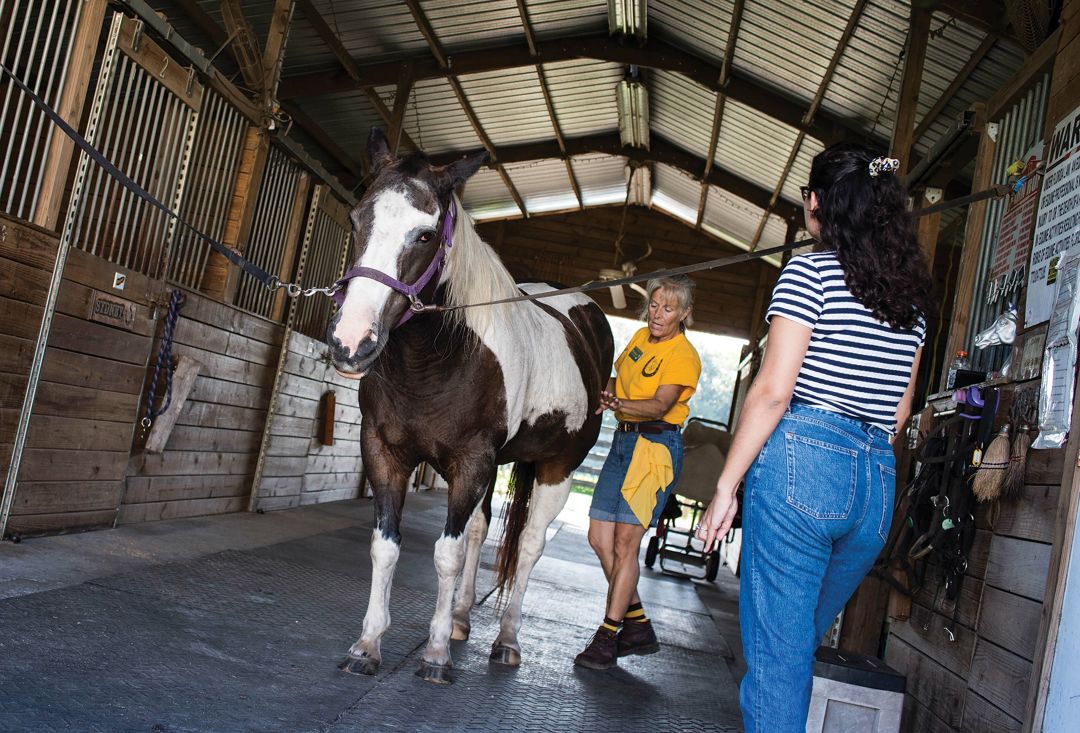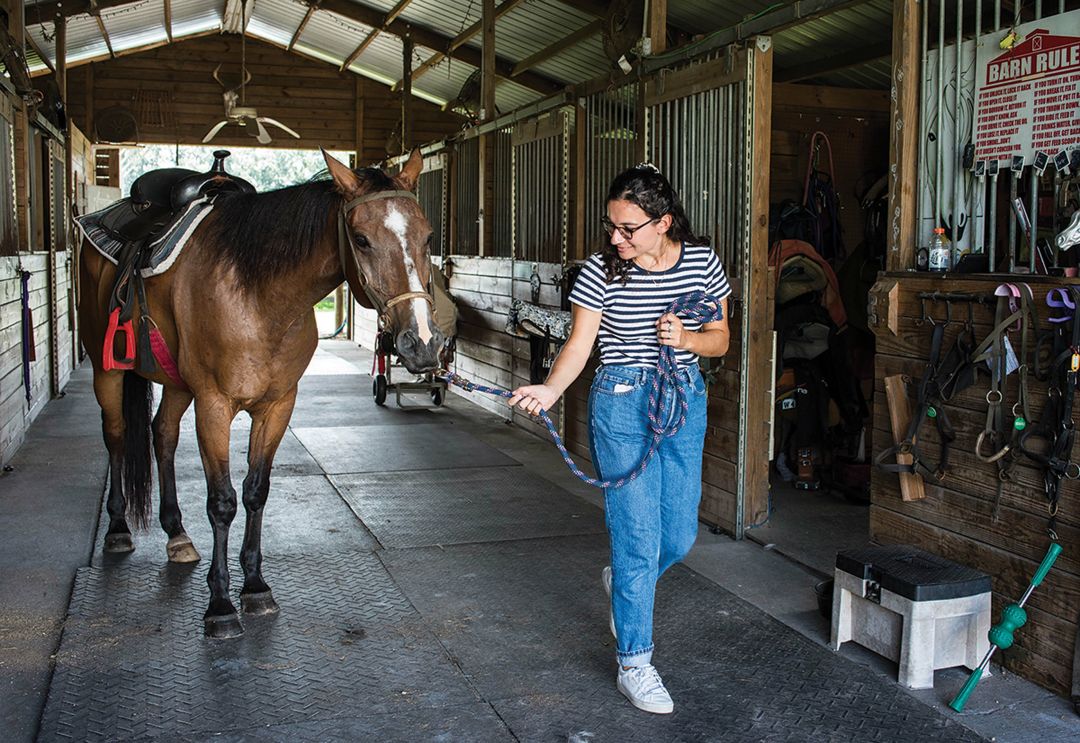Resilient Retreat Is Using Innovative Therapies to Help People Dealing With Trauma

The author (in striped shirt) experiences equine therapy at Prospect Riding Center.
Image: Frank DiCesare
For 30 minutes, I’ve been brushing Sydney Sue, a retired riding horse who is so accustomed to humans that she lifts up her leg in advance when I’m told to raise her hoof for cleaning. I’m at Prospect Riding Center, which partners with Sarasota mental health organization Resilient Retreat for equine therapy, to find out how horses help people heal.
I’ve always been intimidated by horses, but Sydney Sue calms me. Then Prospect Riding Center founder Susan Tambone introduces me to Pepper, a new arrival to Prospect, who is nowhere near as content and accepting.
I relate to Pepper and his unwillingness to trust someone at a first meeting. Tambone tells me to lead him a few steps through the stable. He doesn’t move.
Horses want purposeful directions, Tambone tells me. “Walk on,” she says, more to me than to Pepper. I try once more, attempting to embody a commanding nature I don’t really have. “Walk on,” I order. Miraculously, he walks.
This empowerment exercise, part of a larger equine therapy practice, is just one of the treatment methods used by Resilient Retreat, which works to help heal trauma survivors and professionals who deal with crisis situations. Patients might include adults who have suffered acute trauma, like survivors of child abuse, domestic violence and sexual violence, but Resilient Retreat also sees teachers and nurses who encounter crisis, loss and trauma every day at work.
The nonprofit was incorporated in 2018 by Sidney Turner, a psychologist who received her Ph.D. from the University of New Hampshire and now works as an affiliate assistant professor at the University of South Florida. As she conducted her research, she felt stifled by constraints. She found herself wanting to work in the field rather than just in the classroom, with an approach that incorporates more than just mental health counseling.
“It takes about 20 years for mental health research to translate into practice. I knew there were all these things that could help people more quickly, but we weren’t doing them,” Turner says. “So, I said, ‘That’s it. I’m leaving my academic job and opening a nonprofit.’”
As a former sufferer of trauma that caused an intense feeling of being in constant “fight or flight” mode, she tried everything—including various therapies and medication—without success. Finally, she took a dance class, and that was what did it. Eventually, her hypervigilance was gone.
Turner says her path to healing is the traditional treatment protocol. The initial instinct to help someone suffering from trauma is to direct them to a mental health counselor. But, she says, “That’s not the only part of the equation. Trauma is mostly a body-based disorder that has an impact on the body. I think we’ve gotten it wrong.”
Turner had a specific vision: a residential retreat center where guests would stay between three and five days to sample a wide variety of programs, like gardening, neurofeedback and meditation.
After considering other parts of Florida and Texas, Turner handpicked Sarasota for its headquarters. “Sarasota just kind of hit every mark that we were looking for,” says Turner. “It’s a giving and caring community, and the nonprofits want to work with each other.”
Through the Conservation Foundation of the Gulf Coast, she found an anonymous donor who had 84 acres of lush, rural land on Fruitville Road east of I-75 near Old Miakka. The donor wanted the land to be used for “something meaningful,” says Resilient Retreat’s executive director Lisa Intagliata. The donor also wanted the land to remain under a conservation easement. Because of that, Resilient Retreat can only build on 1 percent of the site.
Resilient Retreat broke ground on the construction of an 18,000-square-foot facility in November 2020, but Intagliata says the center won’t open until November 2022. When complete, the facility will be able to house 30, although the retreats for those with significant trauma won’t go much higher than 15 people.
With its cozy Danish furniture styling and Jack-and-Jill bathrooms, the retreat space doesn’t look cheap, and it’s not. Intagliata puts the price tag of the buildout at around $7 million, and the Resilient Retreat team has embarked on a capital campaign
for $8 million—the cost of construction plus a $1 million facility endowment. So far, they’ve raised about $2.4 million, a majority of which comes from one gift.
In the meantime, since 2018, Resilient Retreat has screened more than 400 people for services through phone calls and online applications. They have six employees and 150 volunteers. All of the services they offer—except for large trainings—are free. That’s standard practice in this line of work, Turner says. About 84 percent of people don’t access mental health services due to cost.
“If you’re dealing with someone who is suicidal or who has been raped, you don’t want to be sitting down and saying, ‘How much money do you make a year?’” she says.
Aside from private contributions and grants from local foundations, Intagliata and Turner plan to rent out the property, including an on-site barn-turned-community center that will house as many as 100 people for events. The previous owner used to lease out the wooded back yard for weddings; Intagliata’s goddaughter was married there.
Both Turner and Intagliata say trauma services are more in need today. Covid-19 has heightened the attention around the deep loss and grief that many people are facing. The number of participants they screen increased by 196 percent from March 2020 to March 2021, according to Intagliata. Their trainings are also picking up. They have an upcoming program scheduled with the Sarasota Police Department.

After considering other parts of Florida and Texas, Turner handpicked Sarasota for Resilient Retreat's headquarters.
Image: Frank DiCesare
Retired Sarasota Police Department Sgt. Tammy Featherstone is one of the nonprofit’s 150 volunteers. When she first met Turner and heard her talk about concepts like “compassion fatigue” and “vicarious trauma,” she felt an understanding rustling inside her. Finally, she had a word for emotions she’d never known how to express.
That’s the kind of breakthrough Turner hopes most of Resilient Retreat’s clients will have. On average, the nonprofit’s employees see people who are 13 years out of their trauma. “A lot of the people who have come here have tried therapy, have tried medication, and they feel stuck,” Turner says. “I believe people can be cured. I don’t believe this is a life sentence.”
Turner says she’s already fielded calls from people who want to franchise the center in other states. “Nowhere else has done this, which is weird to me,” she says. “It’s not rocket science. Let’s get people together, give them tools that are proven to help with trauma and let’s break the cycle.”
As Pepper follows me back to his stable, I think about what I can learn from him—that trust isn’t easily given, but with a little bit of hard work and the human equivalent of “Walk on,” it can be found.



